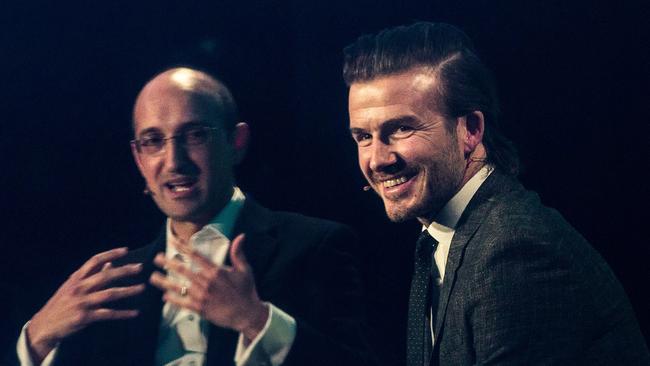Black Box Thinking - how Matthew Syed learns from mistakes
Do you habitually deny making mistakes? Writer Matthew Syed says you are ignoring an opportunity to grow and succeed.

Black Box Thinking: The surprising truth about success by Matthew Syed (Hachette, $35)
What is the biggest thing holding back society — and for that matter, business? It is a complex question, but Matthew Syed has a simple answer: it’s our unwillingness, indeed our incapacity to learn from our mistakes. Syed, a one-time table tennis champion and columnist for The Times, has just released Black Box Thinking, which looks at the upside of failure.
“If you see mistakes and weaknesses as an opportunity to improve, one’s relationship to the information is fundamentally different than if you see it as an indictment of who you are,” he says. “If you think of it as an indictment, then suddenly the information becomes threatening, so one gives it a bit of a makeover. ‘It wasn’t really a mistake by me; it was complications in this case,’ is what a doctor might say. A lot of the intellectual energy of the world goes toward spinning mistakes; it doesn’t go into learning from mistakes, it is a massive deep seeded cultural and psychological problem.”
Syed says he has always been very keen to try to understand how success happens: “What are the strands that link great footballers, great cyclists, great rugby teams? Are there any lessons beneath the surface that can help us understand how success happens.”
He began thinking about this in terms of sport — one of his chapters is called The Beckham Effect, about footballer David Beckham — but then realised it applied equally to business, politics, science.
“I decided to try to start looking a bit deeper, “ he says. “And the book emerged from what I felt was a fundamental truth of all successful institutions.”
The worst example is in the medical profession, he says: “Almost 400,000 patients die every year in America alone because of avoidable errors. Doctors, their ego gets in the way, they have a whole range of euphemisms to cover up their mistakes.”
It is one of the defining differences between professions, in Syed’s opinion.
“Even though we live in the same broad culture, there are institutions that have different ways of thinking about the world.
“If you go into aviation or Google or the Mercedes Formula One team, the attitude there is very different from that in healthcare or in politics or in the criminal justice system, and most other areas of our lives, I’m sorry to say.”
An Oxford graduate with a first in politics, philosophy and economics, Syed has a keen sense of history. It was in ancient Greece that man first saw the questioning of “tribal, mythical ideas” as an opportunity to learn, he says. It happened again with Galileo and Bacon.
“Science is clearly a successful discipline, and yet its defining hallmark is that it fails all the time. If you look at all the theories we’ve jettisoned over time because they didn’t make accurate predictions, that’s precisely why it succeeds. Aviation learns from all the near-miss events, the greatest strides in system safety have emerged from real-life accidents.”
But could it be that our medical institutions are unwilling to admit to mistakes lest they are inundated by lawsuits? Syed is not so sure.
“It’s true that scientists would never attempt to develop a model if they thought all of their failures would lead to the sack,” he says. “But remember this. Even when financial traders are given the maximum incentive to make as much money as possible, they still find it very difficult to sell their losing stocks. You should sell the one that in the future is going to go down some more, because you want to get rid of that, but most traders find it very hard to sell their losing stock because they don’t want to crystallise their loss because that proves it was a mistake to buy it in the first place.”
There is now a cottage industry pushing corporates to try Black Box Thinking.
“Certain people, for some reason which I can’t explain if I’m being honest, have this almost scientific mindset,” Syed says. “Those people who see the world as a very complex place, as a place that is infinitely rich and diverse, those people tend to see any information that reveals weaknesses in the way we think about the world as an opportunity to grow, and people who tend to see the world as very simple feel very threatened by mistakes.”
What our staff are reading
Money: whence it came, where it went, by John Kenneth Galbraith (Houghton Mifflin, 1975): I’ve never seen so many clean explanations of a subject that seems so hard to fully understand. The late, great Harvard professor dismisses that defeatist notion by saying: “There is nothing about money that cannot be understood by the person of average curiosity, diligence and intelligence.” I see what Galbraith means. He starts at the beginning — the first currency as chunks of metal, then coins, then notes, and proceeds to unpack concepts such as inflation and regulation and the Great Depression with a combination of detail and humour. The compelling point Galbraith makes is that “the problems we face today are not new ones, they have been met before, and overcome”. - Chris Kohler, online business reporter.
Sleeping With Your Smart Phone: How to break the 24/7 habit and change the way you work by Leslie A Perlow (Harvard Business Review Press): Get past the title, because this book has very little to do with smartphones — rather the culture of always-on and its impact on morale. Perlow’s premise is simple: allocate each person a day of the week when they can leave work at a reasonable time and stick to it. But the practice is incredibly difficult, as a group of Boston Consulting Group’s most notoriously demanding partners found. Some couldn’t hack it. Those who did, got the spoils of lower staff turnover and a happier, more cohesive team. - Samantha Hutchinson, property reporter.
On the Brink: Inside the race to stop the collapse of the global financial system by Henry A Paulson (Business Plus): Of all the tales of the chaos at the height of the financial crisis, Hank Paulson’s account is one of the more gripping, and controversial given his former role as CEO of Goldman Sachs — one of the many banks the US government was racing to save. It’s got something for everyone, making the book accessible to a broader audience than just business people. The former US Treasury secretary’s daily accounts of September 2008 provide a glimpse into the decisions that still permeate through markets today. - Michael Bennet, banking writer



To join the conversation, please log in. Don't have an account? Register
Join the conversation, you are commenting as Logout